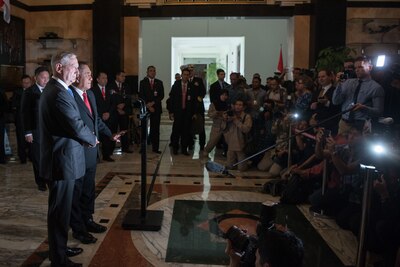By Jim Garamone DoD News, Defense Media Activity
WASHINGTON, Jan. 23, 2018 — Building alliances and partners
are at the crux of Defense Secretary James N. Mattis’ trip to the Indo-Pacific
region.
Mattis spoke to reporters on his way to Jakarta, Indonesia,
where he will meet with President Joko “Jokowi” Widodo and Defense Minister
Ryamizard Ryacudu.
“We probably engage with the Indonesian military more than
any other nation anywhere in terms of mil-to-mil engagements,” Mattis said.
He tied the trip to a line of effort in the newly released
National Defense Strategy: strengthening existing alliances and making new
partners. “That's why we go out here on trips like this: … for the normal
consultations with each other,” he said.
The secretary stressed that the United States is a Pacific
power and has served as the guarantor of the international order in the region
since the end of World War II. That has been good for all the countries of the
region, he said, including those in competition with America.
‘A Peaceful, Prosperous, Freer Asia’
“What we want out here (is) … a peaceful, prosperous and
freer Asia with a free and open regional order defined by the rule of law,” the
secretary said. “What we're looking for here is … that small nations get the
same respect, the same regard as … larger nations. Every nation matters and
there should not be any bullying or shredding of trust toward others.”
Mattis wants to increase maritime cooperation in the region,
and Indonesia -- the connection point between the Indian and Pacific oceans --
is key to that.
The secretary will also visit Vietnam where he expects to
discuss freedom of navigation in the South China Sea, and the respect for
international rule of law and national sovereignty.
Mattis is visiting Hanoi to hear more about how Vietnamese
leaders see things developing as they maintain sovereignty over their
territorial waters and economic zone, that they maintain oversight of that.
“Obviously, we want to know what level of engagement they want
with us: Is it professional military education; is it joint training?” he said.
“I want to sit down and just talk with them, get a better sense of the
pragmatic steps that we can take as we move the relationship forward into one
of trust and collaboration.”









No comments:
Post a Comment